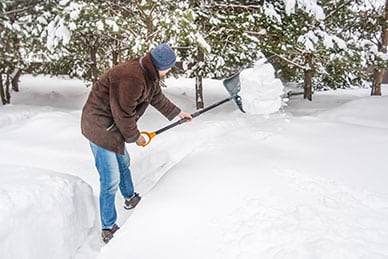For many people, the long dark months of winter are a reason to hole-up inside. For others, however, winter can also mean an increase in physical activity. There are many outdoor hobbies that require cold weather, such as skiing and sledding. In addition, for people in many areas, the cold weather brings an increase in chores such as shoveling newly fallen snow. However, there may be good reason to avoid some of these cold weather tasks. According to new research, shoveling snow boosts the risk of a heart attack and other potentially deadly cardiovascular events.
Cold Weather and Cardiovascular Health
Cold weather brings a variety of risks to cardiovascular health. When we experience cold, our bodies constrict our blood vessels. This helps to conserve body heat but also increases blood pressure while decreasing blood supply. Combined with a strenuous activity, this factor alone can increase the risk of cardiovascular disease. Cold weather also can increase the risk of blood clots, which then easily can block these constricted blood vessels.
In addition, winter brings with it several risks that are related to human behavior. The festivities of the season often include fatty or rich foods, alcohol consumption and even smoking. These create an even greater strain on the heart. In addition, many people are more sedentary during the winter months and become somewhat out of shape. Suddenly taking on a very physical activity places stress on their system.
How Snow Shoveling Boosts Risk of Heart Attack
Considering our knowledge of how cold weather affects the cardiovascular system, it should come as no surprise that snow shoveling is a particularly risky activity. In fact, recent studies show that heavy snowfall (20 centimeters or more) is correlated with a 16 percent higher chance of heart attack in the general population and a 34 percent increase in men. In fact, snow shoveling has been shown to increase a heart attack more than being on a treadmill or otherwise performing strenuous activity.
Researchers believe that this is due to the effects of the cold, but also to a few unique characteristics of this chore. First, it is a very strenuous activity that involves mainly upper extremity muscles. These muscles can become fatigued more easily, thereby increasing blood pressure and cardiovascular risk. In addition, most people go out to shovel snow in the morning hours, when we are particularly prone to cardiovascular events due to our circadian rhythms. Cortisol and other biochemicals that increase cardiovascular strain are present in the highest amounts in the hours immediately after we rise.
Is Snow Shoveling the Only Risk?
 Snow does not just bring more chores, but also a variety of weather-specific activities. Many people all over the world enjoy ice skating, skiing, snowboarding, sledding and more. Could these recreational activities increase heart attack risk as much as snow shoveling? Clearly, more research will be needed in order to evaluate the risk of cold weather alone. However, it is clear that people should try to stay in good shape throughout the winter months and avoid stress on their heart through activities such as smoking or eating unhealthy foods. Winter activities are not generally a risk for people who have good heart health. In fact, staying healthy in the winter can be a healthy decision for most people.
Snow does not just bring more chores, but also a variety of weather-specific activities. Many people all over the world enjoy ice skating, skiing, snowboarding, sledding and more. Could these recreational activities increase heart attack risk as much as snow shoveling? Clearly, more research will be needed in order to evaluate the risk of cold weather alone. However, it is clear that people should try to stay in good shape throughout the winter months and avoid stress on their heart through activities such as smoking or eating unhealthy foods. Winter activities are not generally a risk for people who have good heart health. In fact, staying healthy in the winter can be a healthy decision for most people.
Maintaining Good Heart Health All Year Long
Whether you will be getting your cold weather exercise from snow shoveling or hitting the slopes, it is important to keep your cardiovascular system in good working order to lower the risk of heart attacks. There are several ways that you can accomplish this. First. eat a healthy diet that is low in saturated fats, cholesterol and salt. While this can be difficult during the holiday season, moderation is key. Second, get plenty of cardiovascular exercise. Most experts recommend either 150 of moderate intensity or 75 minutes of vigorous activity a week. In general, cardiovascular exercise is exercise that raises your heart rate and makes you sweat.
In addition, there are several natural supplements that can help you to maintain good cardiovascular health by protecting against free radicals and helping to sustain healthy cells. These include:
- B vitamins, which have been found in several major studies to reduce stroke and heart attack deaths by reducing lifelong damage to the inner lining of blood vessels and other delicate cardiovascular tissues.
- Vitamin C, which acts as an antioxidant and also supports healthy cells and tissues.
- Coenzyme Q10, a powerful antioxidant that prevents oxidative damage to heart cells and DNA.
- Grapeseed extract, which lowers systolic blood pressure while also reducing the effects of clotting disorders.
- Lycopene and lutein, antioxidants that also protect against atherosclerosis (hardening of the arteries) that is known to contribute to heart attack and stroke.
- Bioperine or black pepper extract, which has been shown to increase the absorption and effects of other natural supplements.
This study should not be seen as a warning against shoveling snow or otherwise being active in the cold weather months. Rather, it is an encouragement to stay active and maintain good cardiovascular health all year long. With the right diet, exercise and natural supplements, most of us will be shoveling snow (whether we like it or not) for many decades to come.



Leave a Reply